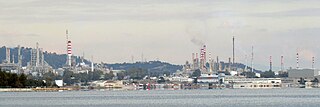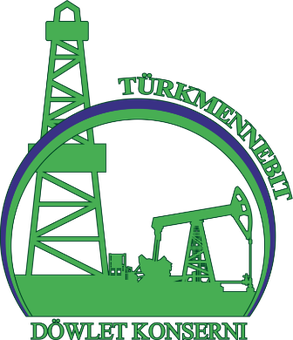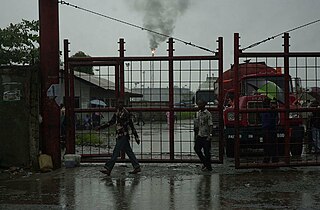The Jebel Ali refinery was constructed from 1996 to 1999. It is located in Dubai and operated by the Emirates National Oil Co. (ENOC), which is owned by the Government of Dubai. It is a 120 kbpd gas condensate refinery, and processes mainly condensate or light crude oil. These inputs are processed to various products, including LPG, naphtha, jet fuel, diesel fuel and fuel oil. The plant consists of two 60 kbit/s condensate distillation units (often referred to as condensate splitters) and five merox sweetening units.
An upgrade - costing $850 million (US) - was implemented in 2010 for the production of reformat and low-sulfur naphtha through installation of a reformer and a hydrotreater. In 2014, a contract for a new upgrade project was awarded to KBR. The upgrade will lead to the production of Euro V grade products.
25°01′06″N55°08′35″E / 25.01844°N 55.14305°E

An oil refinery or petroleum refinery is an industrial process plant where petroleum is transformed and refined into products such as gasoline (petrol), diesel fuel, asphalt base, fuel oils, heating oil, kerosene, liquefied petroleum gas and petroleum naphtha. Petrochemical feedstock like ethylene and propylene can also be produced directly by cracking crude oil without the need of using refined products of crude oil such as naphtha. The crude oil feedstock has typically been processed by an oil production plant. There is usually an oil depot at or near an oil refinery for the storage of incoming crude oil feedstock as well as bulk liquid products. In 2020, the total capacity of global refineries for crude oil was about 101.2 million barrels per day.
In petrochemistry, petroleum geology and organic chemistry, cracking is the process whereby complex organic molecules such as kerogens or long-chain hydrocarbons are broken down into simpler molecules such as light hydrocarbons, by the breaking of carbon–carbon bonds in the precursors. The rate of cracking and the end products are strongly dependent on the temperature and presence of catalysts. Cracking is the breakdown of large hydrocarbons into smaller, more useful alkanes and alkenes. Simply put, hydrocarbon cracking is the process of breaking long-chain hydrocarbons into short ones. This process requires high temperatures.
The oil and gas industry is usually divided into three major sectors: upstream, midstream, and downstream. The downstream sector is the refining of petroleum crude oil and the processing and purifying of raw natural gas, as well as the marketing and distribution of products derived from crude oil and natural gas. The downstream sector reaches consumers through products such as gasoline or petrol, kerosene, jet fuel, diesel oil, heating oil, fuel oils, lubricants, waxes, asphalt, natural gas, and liquefied petroleum gas (LPG) as well as naphtha and hundreds of petrochemicals.

Hydrodesulfurization (HDS), also called hydrotreatment or hydrotreating, is a catalytic chemical process widely used to remove sulfur (S) from natural gas and from refined petroleum products, such as gasoline or petrol, jet fuel, kerosene, diesel fuel, and fuel oils. The purpose of removing the sulfur, and creating products such as ultra-low-sulfur diesel, is to reduce the sulfur dioxide emissions that result from using those fuels in automotive vehicles, aircraft, railroad locomotives, ships, gas or oil burning power plants, residential and industrial furnaces, and other forms of fuel combustion.
Hydroskimming is one of the simplest types of refinery used in the petroleum industry and still represents a large proportion of refining facilities, particularly in developing countries. A hydroskimming refinery is defined as a refinery equipped with atmospheric distillation, naphtha reforming and necessary treating processes. A hydroskimming refinery is therefore more complex than a topping refinery and it produces gasoline. The addition of catalytic reformer enables a hydroskimming refinery to generate higher octane reformate; benzene, toluene, and xylene; and hydrogen for hydrotreating units. However, a hydroskimming refinery produces a surplus of fuel oil with a relatively unattractive price and demand.

The Penex process is a continuous catalytic process used in the refining of crude oil. It isomerizes light naphtha (C5/C6) into higher-octane, branched C5/C6 molecules. It also reduces the concentration of benzene in the gasoline pool. It was first used commercially in 1958. Ideally, the isomerization catalyst converts normal pentane (nC5) to isopentane (iC5) and normal hexane (nC6) to 2,2- and 2,3-dimethylbutane. The thermodynamic equilibrium is more favorable at low temperature.
The Ras Lanuf Refinery is a topping and reforming oil refinery in Ras Lanuf, Libya. It is part of a larger petrochemical complex also consisting of an ethylene plant, a polyethylene plant, plant utilities, and Ra's Lanuf Harbor. Until 9 March 2009, the complex was operated by the RASCO, a subsidiary of the National Oil Corporation. The current operator is the Libyan Emirates Oil Refining Company.
Ras Lanuf Oil and Gas Processing Company (Rasco) is a subsidiary of the state-owned National Oil Corporation of Libya. Rasco operates the Ras Lanuf Refinery.
The Zawia Oil Refining Company (ARC) is a subsidiary of the National Oil Corporation (NOC), incorporated under Libyan Commercial Law since 1976. ARC operates the Zawia Refinery, which was built in 1974 by Snamprogetti, Italy. Zawia is currently the country's second largest oil refinery after the Ra's Lanuf Refinery. Primary products include naphtha, gasoline, kerosene, light vacuum gas oil (VGO), fuel oil, base lubricating oils, and asphalt.

Gdańsk oil refinery is a 10.5 million tonne per year refinery located near the Polish city of Gdańsk on the Baltic Sea. The refinery was established in 1975 to supply fuels and lubricants, and has undergone several upgrades and expansions to increase its capacity and the range of products available. It now has a Nelson complexity index of 11.1. It is one of two oil refineries in Poland, the other is Plock refinery.

Corinth Refinery is an oil refining complex in Greece, the largest industrial complex in the country with a capacity of 380,000 barrels per day (60,000 m3/d), and it is operated by Motor Oil Hellas.
The Aspropyrgos Refinery is an oil refining complex located near Aspropyrgos, a suburb of Athens, in Greece. It is operated by Hellenic Petroleum. The refinery has a nominal annual refining capacity of 7.5 million tons.

Türkmennebit, also known by the translation of the name as Turkmenoil or Turkmenneft, is the national oil company of Turkmenistan. It was established by a presidential decree reorganising parts of the former Ministry of Oil and Gas in July 1996, and has its headquarters in Ashgabat. The chairman of the company is Guychgeldi Baygeldiyev. The main oil fields operated by Türkmennebit are Goturdepe, Barsa-gelmez, Nebitdag, Körpeje, Gamyşlyja, Çeleken and Kemer, mainly in Balkan Province near the Caspian Sea.

Petroleum refining processes are the chemical engineering processes and other facilities used in petroleum refineries to transform crude oil into useful products such as liquefied petroleum gas (LPG), gasoline or petrol, kerosene, jet fuel, diesel oil and fuel oils.

PTT Global Chemical, also known as PTTGC, is a petrochemical company that specializes in synthesizing olefins and aromatics. It was founded in 2011 and is a subsidiary of PTT Public Company Limited.

The Port Harcourt Refining Company,, is a Nigeria-based oil and gas company primarily specializing in the refining of crude oil into petroleum products. It is headquartered in Port Harcourt metropolitan area of Rivers State, southeastern Nigeria. The company is a subsidiary of the Nigerian National Petroleum Corporation (NNPC).

The Ruwais Refinery is operated by the Abu Dhabi National Oil Company (ADNOC). The complex can process up to 837,000 barrels of crude oil and condensate per day, making it the fourth-largest single-site oil refinery in the world and the biggest in the Middle East. The refinery is situated in the city of Ruwais, in Abu Dhabi’s western region. It is highly integrated with ADNOC’s other plants in the Ruwais industrial area – such as the Borouge 3 petrochemical plant.
The Dangote Refinery is an oil refinery owned by Dangote Group that was inaugurated on 22 May 2023 in Lekki, Nigeria. When fully operational, it is expected to have the capacity to process about 650,000 barrels of crude oil per day, making it the largest single-train refinery in the world. The investment is over US$19 billion.
The Sapugaskanda Refinery is the single largest oil refinery of Sri Lanka. The refinery was built in August 1969 by the Ceylon Petroleum Corporation under the guidance of Iran, initially designed to process 38,000 barrels (6,000 m3) per stream day of Dubai crude oil, and Arabian light crude oil. It was commissioned on 12 October 1969. The facility, which covers an area of 165 acres (67 ha), currently has a capacity of 50,000 barrels (7,900 m3) per stream day.
Harwich refinery is a 500,000 tonnes per year refining, processing, blending and storage facility near the port of Harwich in the UK. The refinery was commissioned in 1964 to process petroleum-based feedstocks into specialist hydrocarbon solvents.